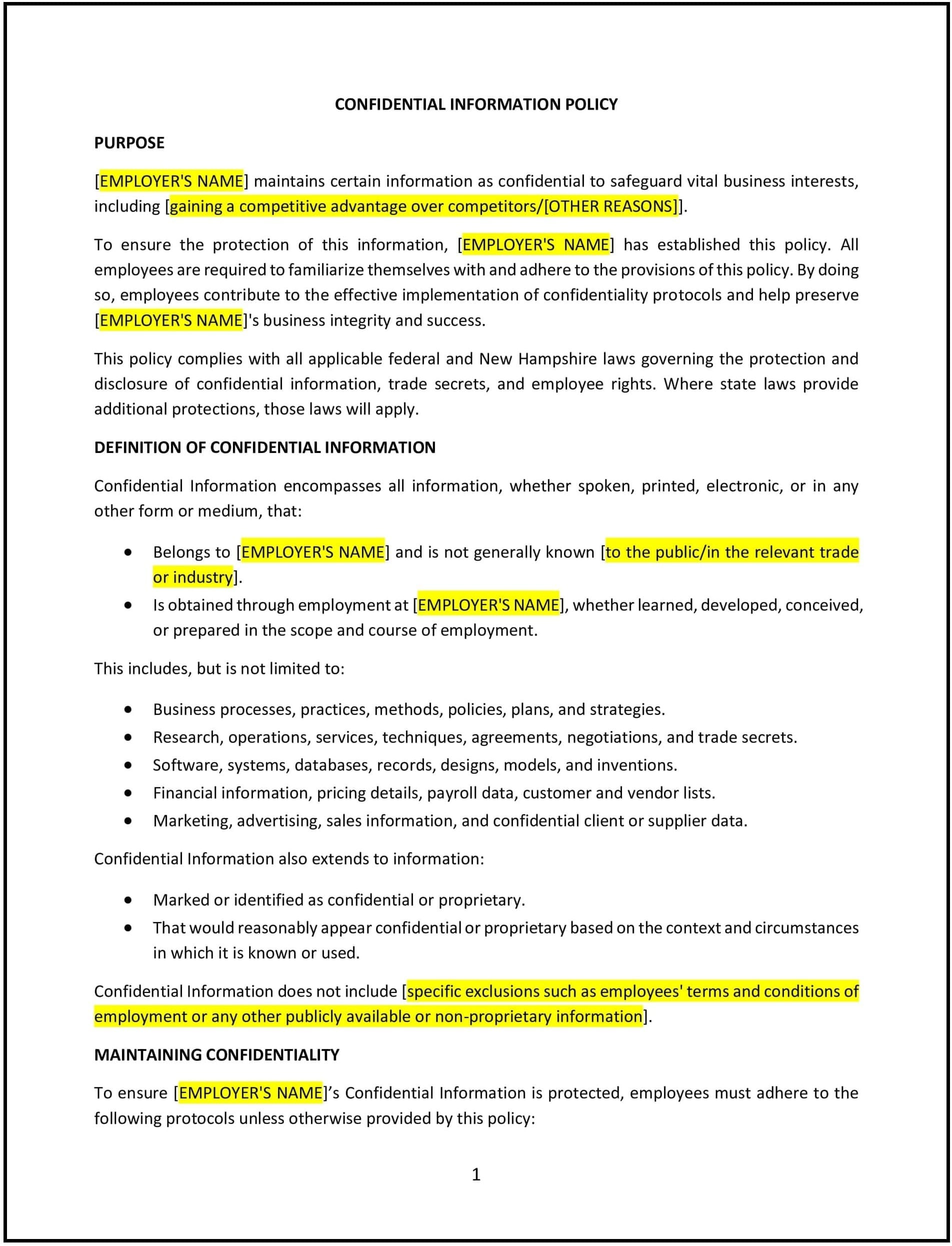Confidential information policy (New Hampshire): Free template
Got contracts to review? While you're here for policies, let Cobrief make contract review effortless—start your free review now.

Customize this template for free
Confidential information policy (New Hampshire)
A confidential information policy helps New Hampshire businesses safeguard sensitive company data by outlining the rules for handling, storing, and sharing confidential information. This policy specifies what constitutes confidential information, how it should be protected, and the consequences for unauthorized disclosure.
By adopting this policy, businesses in New Hampshire can reduce the risk of information breaches, protect their competitive advantage, and maintain trust with clients, employees, and partners.
How to use this confidential information policy (New Hampshire)
- Define confidential information: Clearly outline what constitutes confidential information, including trade secrets, financial data, client information, employee records, proprietary software, and other sensitive company data.
- Establish guidelines for handling confidential information: Set rules for how confidential information should be handled, such as storing it in secure locations, limiting access to authorized individuals, and encrypting sensitive data.
- Define sharing protocols: Specify under what circumstances confidential information can be shared with third parties, ensuring that confidentiality agreements or non-disclosure agreements (NDAs) are in place when necessary.
- Set expectations for employees: Make employees aware of their responsibility to protect confidential information, including guidelines for not discussing or disclosing sensitive data in public or unsecured locations.
- Implement security measures: Outline the security measures in place to protect confidential information, such as password protection, encryption, and access controls, as well as any tools or technologies employees should use to secure company data.
- Address violations and consequences: Clearly define the consequences for violating the policy, such as disciplinary action, including termination, or legal actions for unauthorized disclosure of confidential information.
- Encourage reporting breaches: Encourage employees to report any suspected breaches of confidentiality and outline the process for doing so.
- Review and update: Regularly review the policy to ensure it aligns with New Hampshire regulations and best practices for data protection, and update it as needed to address emerging threats or business needs.
Benefits of using this confidential information policy (New Hampshire)
This policy provides several benefits for New Hampshire businesses:
- Protects sensitive company data: Helps safeguard confidential information, ensuring that it remains secure and that access is limited to authorized personnel.
- Reduces legal and financial risks: Minimizes the risk of legal or financial consequences resulting from the unauthorized disclosure of sensitive information, such as lawsuits or fines.
- Enhances trust and reputation: Demonstrates a commitment to protecting client and employee data, fostering trust and reinforcing the company’s reputation as a reliable and responsible business partner.
- Improves internal controls: Establishes clear guidelines for handling confidential information, promoting consistency and accountability across the organization.
- Supports compliance with data protection laws: Helps businesses comply with New Hampshire state laws and federal regulations related to the protection of personal and confidential data.
Tips for using this confidential information policy (New Hampshire)
- Communicate the policy clearly: Ensure all employees are aware of the confidentiality policy, understand what constitutes confidential information, and know their responsibilities regarding its protection.
- Implement security protocols: Enforce strong security measures, such as encryption, password protection, and secure data storage, to safeguard confidential information.
- Limit access: Restrict access to confidential information to only those employees who need it to perform their job functions, ensuring that sensitive data is not unnecessarily exposed.
- Provide training: Offer training sessions to educate employees on how to protect confidential information, recognize potential threats, and report breaches.
- Regularly audit: Periodically review the company’s data protection practices to identify vulnerabilities and address any issues that could expose confidential information to unauthorized access.
- Review the policy regularly: Update the policy to reflect changes in New Hampshire laws, technology advancements, or business needs that may affect how confidential information should be handled.